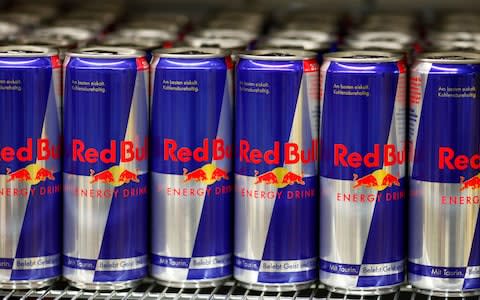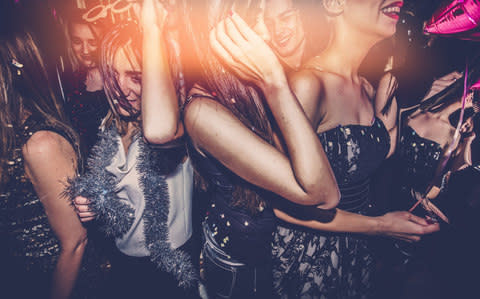What happens to your body after you have an energy drink?

When was the last time you had an energy drink?
Chances are, the answer is not that long ago. According to research that was released in 2016, the UK has the second highest consumption of energy drinks per head in the world (Austria – the home of Red Bull – comes first). On average, we each drink 8.3 litres of energy drinks per year; our overall consumption climbed by 185pc between 2006 and 2015.
However, this thirst for liquid energy is not without its issues. A new study into the drinks, led by Newcastle University and Fuse (the Centre for Translational Research in Public Health), has found that energy drinks are being sold for as little as 25p to children as young as 10. Sales appear to be rising sharply among young people.
The report came as one of the UK’s largest teaching unions described energy drinks as “readily available legal highs”. The NASUWT said the drinks can trigger bad behaviour in the classroom and school yard.
Meanwhile, another study has shown that energy drinks are more dangerous than caffeine alone. The NHS has warned that the risks of heavy consumption of energy drinks among young people have largely gone unaddressed and are poised to become a significant public health problem in the future.
A single can sold by popular brands can contain around 160mg of caffeine – but the European Food Safety Authority recommends an intake of no more than 105mg caffeine per day for an average 11-year-old.

So, what really happens to your body when you consume an energy drink? What are the risks? What happens when you consume large amounts of them? How do children react to them? And what happens when we combine them with alcohol?
We asked an expert to find out...
What is an energy drink?
According to Abigail Morakinyo, founder of Health in Check and a specialist in public health, with experience working for both the NHS and on Harley Street, energy drinks can be defined as non-alcoholic beverages that contain taurine (an amino acid), caffeine, vitamins, and sometimes other ingredients, such as ginseng – a plant root considered to have health benefits, and often used as a stimulant.
They also often contain high levels of sugar. A 500ml Rockstar Punched Energy + Guava Tropical Guava Flavour contains 78g of sugar per serving, and a 500ml can of Monster Energy contains 55g per serving, according to a 2015 survey by Action on Sugar.

What happens to your body when you have an energy drink?
In a recent controlled trial, a study published in the Journal of the American Heart Association found that energy drinks can cause potentially harmful changes in heart function and blood pressure.
Blood pressure was “significantly higher” for six hours after drinking the liquids. Those who drank the energy drinks also had higher QT intervals after two hours. QT intervals measures the time between heartbeats (if they're too long it can cause arrhythmia, an abnormal heart rhythm which can be life-threatening).

Morakinyo explains that within 10 minutes of having an energy drink, caffeine is absorbed in the bloodstream – causing both heart rate and blood pressure to rise.
"The full effects of having an energy drink can be felt within 15 minutes to 45 minutes, resulting in short-term increased concentration and alertness," she explains. "Within an hour, all the caffeine is fully absorbed and this also results in the liver absorbing sugar into the bloodstream. Once the effects of caffeine start to wear off you’re more than likely to experience a significant drop in blood sugar levels. This results in feeling tired and low in energy."
There are also the dental implications to consider: there has been a significant rise in removals of rotting milk teeth over the past decade, fuelled by children's increasingly sugary diets.

What happens when you consume large quantities of energy drinks?
"Consuming large quantities of energy drinks poses potential risks such as palpitations, high blood pressure and nausea and vomiting due to excessive amounts of caffeine in your bloodstream," warns Morakinyo.
"Due to the high sugar content in some energy drinks, weight gain is another risk, and with that comes an increased risk of weight related medical conditions such high blood pressure and diabetes type 2."
Over time you may start to experience withdrawal symptoms such as headaches or anxiety, she adds.

How do children react to energy drinks ?
"Children who consume energy drinks are more likely to develop a dependence or addiction to it," Morankinyo claims.
They have also been recognised as a contributing factor to poor behaviour in children. Darren Northcott, NASUWT national official for education, says: “Teachers have registered concerns with the NASUWT about the contribution of high energy drinks to poor pupil behaviour as a result of pupils consuming excessive quantities of these drinks."
What are the benefits of energy drinks?
"It's true that caffeine acts as a central nervous system stimulant", admits Morakinyo. "When it reaches the brain you feel more alert and less tired. Caffeine is also a common ingredient in certain medications used in the management of headaches." However, Morakinyo emphasises that she believes the negatives (as mentioned above) outweighs the benefits.

What happens when you mix energy drinks with alcohol?
It is now commonplace, especially among young people, to mix energy drinks with alcoholic spirits, reported the NHS in 2014 when it issued a warning over energy drinks. Many pubs and clubs will sell jugs or “goldfish bowls” of Red Bull and vodka.
According to Drink Aware, alcohol mixed with energy drinks can be a dangerous combination. It means you consume more sugar, calories and caffeine than drinking alcohol or energy drinks by themselves. You could also experience increased physical and psychological side effects from drinking this combination, such as heart palpitations, problems sleeping, and feeling tense or agitated.
Interestingly, Drink Aware suggests that combining the two often cause you to drink more, leading to a state of being "wide awake" drunk. In this quantity, Drink Aware even suggests that caffeine can cause cause anxiety and panic attacks.

Though you might feel alert when you combine the drinks, your body is still experiencing the effects of alcohol. That means you can end up drinking more without realising that your judgement, balance and coordination are being affected.
The combination has this effect because alcohol and energy drinks work in different ways. Alcohol is a depressant, which means it slows down the brain’s functions and can act as a sedative – drink a lot and you might slur your words, have slower reflexes and feel sleepy. The caffeine in energy drinks, on the other hand, is a stimulant. If you mix the two, you’ll feel the stimulant effects of the caffeine more strongly, masking the interference caused by alcohol to reaction time, memory and other processes in the brain.

 Yahoo News
Yahoo News 
